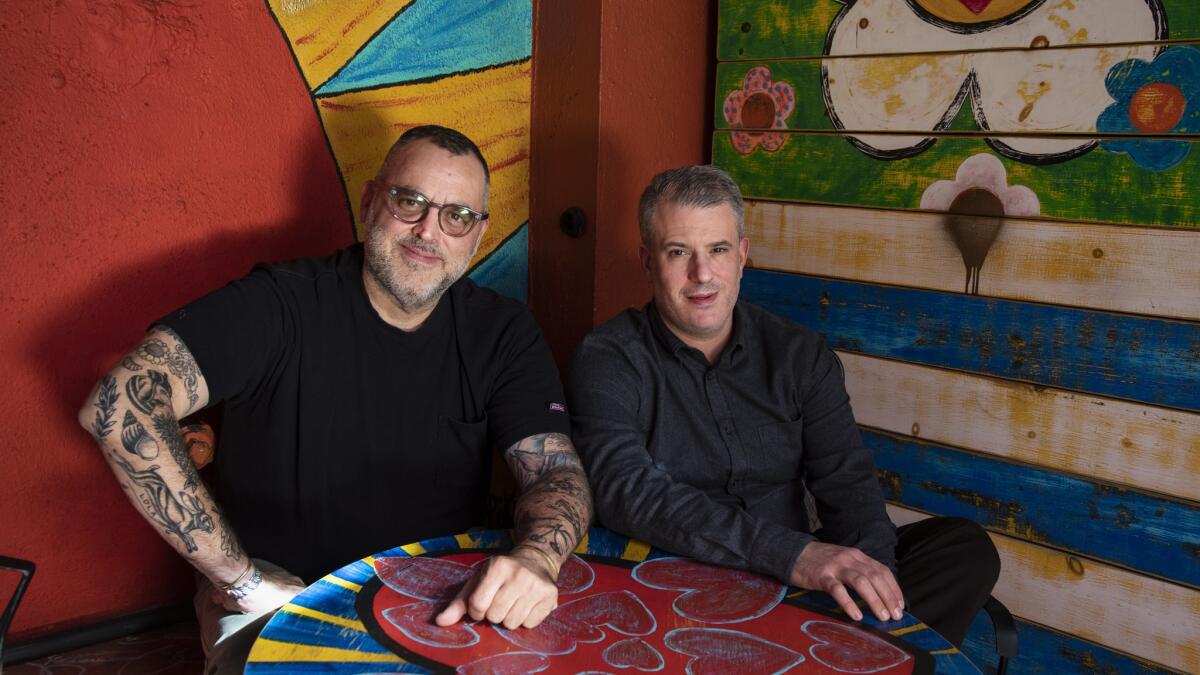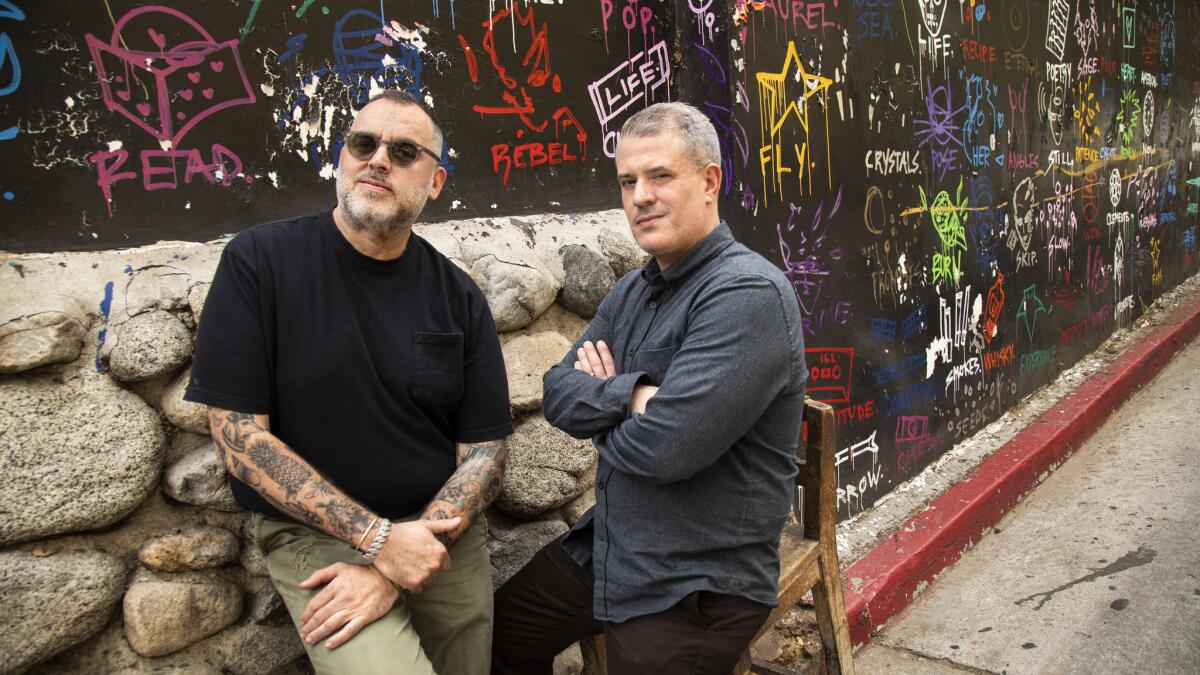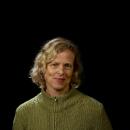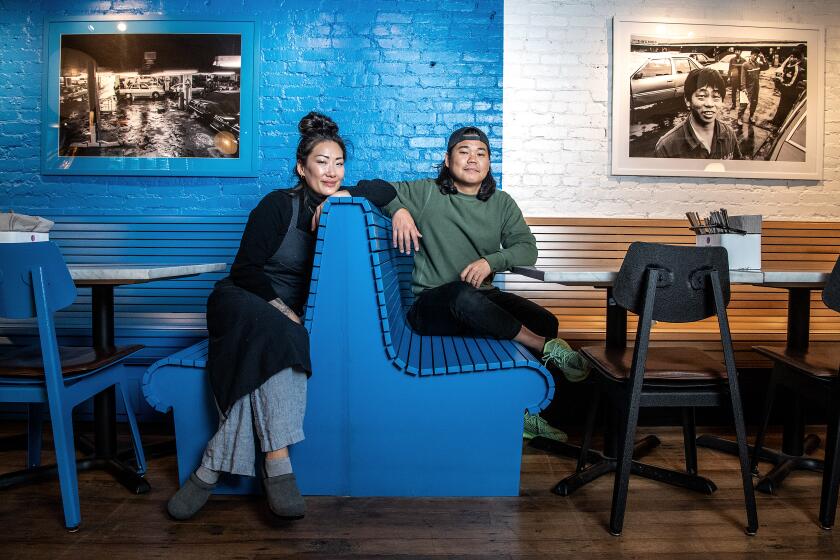Q&A: Talking to the Joe Beef chefs, who wrote a cookbook about the end of the world

- Share via
On a recent morning, chefs David McMillan and Frédéric Morin sat at Chateau Marmont, the swank hotel on the Sunset Strip, to talk about their new book, “Joe Beef: Surviving the Apocalypse, Another Cookbook of Sorts.” It is a sequel to their debut cookbook, which they also wrote with Meredith Erickson, and it is again about the pair’s much-lauded restaurant Joe Beef in Montreal, where they practice a distinctly Québécois style of French-influenced cooking.
In the diffuse light of the hotel’s patio-adjacent dining room there were double cappuccinos on the table, an uneasy smokiness to the air from the wildfires scorching nearby neighborhoods, and the distinct feeling that the ghost of Anthony Bourdain (patron saint of Joe Beef, a habitue of the Chateau) was among us. The end of the world, the unifying principle of their new cookbook, seemed a reasonable topic of conversation, though it quickly strayed darker and truer than just cookbook chatter.
This interview has been edited for length and clarity.
I’m just going to start with the obvious: Why the apocalypse?
David McMillan: There was a moment when it hit us. We’d gone from lean-and-mean cooking machines who could work 120 hours a week and not feel anything and all of a sudden we had multiple businesses, three kids each, 80 employees. And there was a sense of anxiety — we both struggled with anxiety in our careers — and then this burden of responsibility, of financial obligations. We also discovered that we’re loving, sentient people, that these children that were thrust upon us as we were building careers meant the world to us. That all of a sudden we had this heightened sense of awareness that the protection of these beautiful children, that this love that we were feeling that we’d never felt before, that we didn’t even have for ourselves, was, you know, crippling to a point. But us being both, let’s say, in French you say “débrouillard.”
Frédéric Morin: Resourceful.
McMillan: We started to focus on the what ifs? We care so much about our families, about the staff who has worked for us for 10 years who are effectively our wards now, about our restaurants. To some degree, you fear it all going away.
Morin: The thing is, the first book was easy, in a way. Anybody’s first book, you write it at 35 or 40, it’s like from zero to 40, everything you’ve done, every funny story you’ve lived goes in it. Now another fear of midlife life is of repeating yourself, so we tried different approaches but it was all gimmicky. And then we arrived at this: the philosophical essence of how we perceive the apocalypse, but like in a practical, everyday way. We’re huge fans of Bass Pro Shop, of going camping, of alternative fuels.
McMillan: What’s the right ax? What’s the best chain saw? Cooking doesn’t define us. We are cooks, but everybody has a job. We’re both into art, mortise-and-tenon joinery, woodworking, couches, antiques, Persian rugs.
It’s about what gets saved versus what gets lost.
Morin: But it is the end-of-days theme that brings it all together, about how knowing about all parts of life is what you’re going to need to know in the end. It’s a risky theme, because we could have easily gotten into the kind of doomsday, boys-like-guns apocalypse vibe, which we tried hard to steer away from. Because realistically, there’s not an AR-15 or a reserve of gold bullion or dehydrated potato or any thick-walled cement bunker that can help you live for 20 years in the desolate world.
I always put chocolate in earthquake and survival kits.
Morin: It’s a good idea, because there’s always too much food at dessert.
McMillan: A lot of guys are way too cool to do chocolate mousse —
Morin: Or to eat it.
McMillan: But I’ll tell you, if you put chocolate mousse on the menu, it’s going to outsell everything else hands down.
Morin: What’s more important than your chocolate mousse skills is that you go, like a determined lemming, to the flea market on a Sunday morning, and pick up milk glass or a bunch of mismatched cups, six weird glasses to serve the mousse in. And that makes your dinner — that chocolate mousse in your flea market finds. There’s also a cow in the survival kit. For milk. You can do it with Carnation milk too; chocolate mousse made with Carnation milk is really good.
The cow is hard to fit in the root cellar. “What would Jacques Pépin do?” is a recurrent theme in your book.
McMillan: We grew up, both of us similar — me Anglophone, him Francophone — which is exactly Quebec. We grew up in the same kind of poor, suburban way. He didn’t have cable, I didn’t have cable, we got three channels on TV and one of them was Vermont Public Television. I’m a Vermonter at heart through osmosis because I watched Vermont television; he watched Vermont television — we’re both raised on the Victory Garden and Julia Child, Jacques Pépin, Pierre Franey, “This Old House.” So when we had a restaurant, we planted a victory garden, we did all the carpentry, we’re doing French food, we want copper pots like Jacques Pepin, our restaurant is a PBS restaurant, our aesthetic was always the antique plates, our food was French. Even with the Nordic trends in cooking, we were stuck with Pierre Franey.
And now we’re the last men standing that do liver with onions and kidneys with Madeira sauce and I can do crepes for dessert and people love it. These foods are extinct. Rabbit with mustard sauce for two, extinct, duck a l’orange properly done, not fake gastrique and duck breast sliced, the whole damn thing, done right, the leg served to you as a first course with salad and then the breast as a second with the sauce and the press. This cooking is dead.

This is a very alcohol-driven, maybe alcoholic book.
McMillan: I promote excessive drinking, I promote dining, I promote excessive eating. I’m just one of the 30% that can’t. I’m an alcoholic-addict. Now in sobriety I realize that there are a lot of people who come to my restaurants, that have a bottle of wine with dinner and have a wonderful conversation and a wonderful meal and go home. I am not one of those people.
I have zero education, I’m 47, five restaurants, it’s all I know. I went to Paris right after rehab, and I went to Burgundy, which is insane; it’s like the ground zero of alcoholism on Earth. I went to an AA meeting in Beaune, which is impossible to find, it was secret; they don’t want you to have AA meetings in Beaune. And I was sitting there with three of the top 10 winemakers in Burgundy. At the end of the day, wine is not a romantic beverage, it’s a drug. I’ve been to Paris a dozen times — I know the city well from 3 p.m. to 2 a.m. in a haze; now I ride a bike through the empty streets at 5 a.m., that’s Paris, the other side, the positive light of day, sober.
Morin: Now I find situations where I’m not drinking even more interesting. Like I want to go to a big holiday, big snowstorm, fire, beef, truffles, shallot sauce, red wine sauce — but sparkling water. I have ice cream after dinner now, I don’t have a half bottle of Poire Williams.
The thing is, with every substance, for every marrow bone with black truffle and Epoisses you have, the next dinner is going to be less. For every fifth bottle you have, the next four bottles are gonna be lesser. Every day you commit excess in your field of excess, it’s gonna make happy harder to find. You can’t sit down and watch a movie because it’s boring compared to that buzz, of that thing that was your poison. That’s the hard part. Now I love ice cream after dinner. Now I try to go 60 miles an hour, not more, not less.
Every day you commit excess in your field of excess, it’s gonna make happy harder to find.
— Frederic Morin
McMillan: The whole day is consumed by staying 60 miles an hour — that in itself is everything.
Morin: And I think with Bourdain, either the life that was full of those 140-miles-an-hour moments, and times alone at zero —
McMillan: — fire-roasted moose and the finest wines and then an eight-hour car drive in the rain back to a … hotel in St. John’s, Newfoundland. Down there on his phone, things going wrong, the darkest six-hour car ride you could possibly imagine. We were there with him in November. We knew there was a darkness. But you have to understand, I was in very advanced alcoholism and drug addiction and Fred was not happy either.
The problem is the 60-mile-an-hour thing, also children. I went to rehab for both alcoholism and bulimia, which is another variation of the same thing.
McMillan: It’s addiction. I used to be 400 pounds. When my food was taken away from me, I quadrupled my alcohol intake and started with drugs again. One of the things was taken away from me, so I amped up the other one. They said, you’re not an alcoholic, you’re an addict. You’ve been an addict since you were 6 years old. You had a traumatic event that happened when you were 6. By 7 I was fat, by my teens I found drugs and alcohol. I’m totally addicted to everything. Sometimes I see people outside of restaurants, and I know that they’re addicts, I know it. But then I walk into the warmth of my restaurants, and I see a man at the bar, you know, eating in a certain style, and I’m like: same as outside. Full-blown addict.
Morin: But it’s not a flaw. It’s management, it’s a disease, it’s an allergy, it’s whatever it is. And for a lot of people, eating too much fries is deep, deep trauma. But I learned not to judge. That’s the thing with AA meetings, you think it’s bad and then there’s this child prostitute and you’re like —
McMillan: Oh yeah, you hear a story and you’re like, I can’t even believe you’re here and alive, this happened to you at 16 years old until you were 20, a beautiful young girl. Horrific … It makes you believe in how you even got out of bed in the morning and still have a job. You can’t judge anyone. Be nice, kind and compassionate to everyone, do the best you can. Tony [Bourdain] was like that. He’d say that to us all the time. He would get mobbed. He’d sign autographs for anybody, he’d take a picture with anybody who’d ask. I’d say, how do you do that? He’d say yes to everybody, he’d be nice to everybody, all the time. In the D-minus celebrity that Fred and I have, we do get bothered for pictures often; sometimes being private people we want to say no. But Tony was like, no, no, no, you … be a good boy and you … take that picture.
Morin: Listen, in the end I have a house that I love, we have restaurants that we like, my kids can play sports and go to school and things; it’s because of those Tony shows.
Be nice, kind and compassionate to everyone, do the best you can. Tony was like that.
— David McMillan
McMillan: We owe everything to him. It’s what he wanted us to do; that’s what we will do now.
Morin: Now I’m like, OK, if they feel like they need to idolize a chef, then that’s good, that’s their thing. And it took a lot of energy for me to judge them and judge other people and it just made bogeyman out of people in the world that I drank to avoid.
It’s a lot easier to just let it go. You’re talking about metaphors rather than zombies; what you’re trying to do is make a safe place, which is not judgmental.
Morin: Yeah. And the restaurant in Montreal is a bit like that. It is a safe place.
McMillan: We understand the word “restaurant” [in a French accent] is restorative, like a rest area. To walk into a warm, small room, with comfortable seats and smiling men and women who are eager to serve you, and to cut all the luxury … out. They get to a first-name basis with you immediately, how are you, you good? What do you feel like drinking? Coffee, no problem.
Because that’s what survivalism is: feeding people.
McMillan: You came in. You were outside hunting all day? Now it’s warm.
Morin: You’re going to have to find a new kin. You’re going to have to form a new tribe, a new household. And that is the restaurant.
Very true. But if I’m an L.A. diner and our winter is metaphorical, how do I cook from this?
Morin: In French we say, “la misere est plus douce au soleil” — hardship is milder under the sun. So in L.A., maybe you don’t have much money, you want to do a little project, you want to do tacos in an alley, you can make delicious tacos. Maybe here the summer gets so hot people don’t get outside. I drove through California and Arizona in August two years ago and it was unbearable. Maybe people nest inside.
McMillan: Air conditioning, lighter meals; that’s the winter here. [Laughing.] Maybe the portions should be smaller?
Instagram: @AScattergood
More to Read
Eat your way across L.A.
Get our weekly Tasting Notes newsletter for reviews, news and more.
You may occasionally receive promotional content from the Los Angeles Times.











